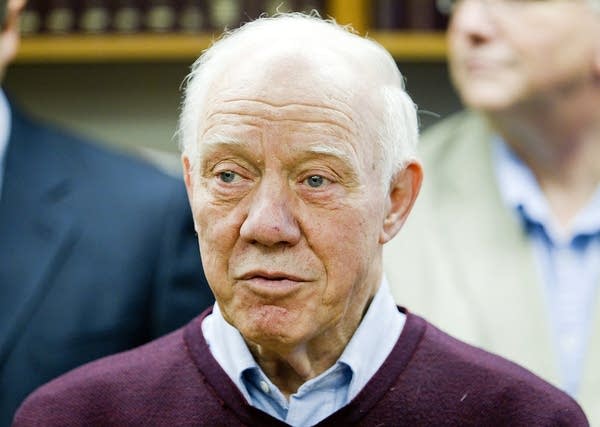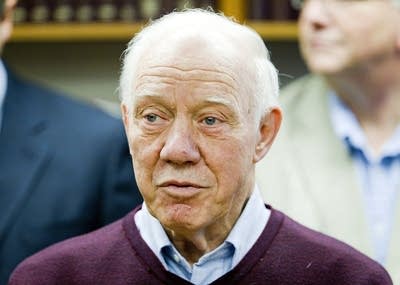Rep. Jim Oberstar's concession speech
Go Deeper.
Create an account or log in to save stories.
Like this?
Thanks for liking this story! We have added it to a list of your favorite stories.

Democratic U.S. Rep. Jim Oberstar, who has served Minnesota's 8th District for 36 years, lost his reelection battle against Republican challenger Chip Cravaack.
Surrounded by his staff and longtime supporters at his office in Duluth, Oberstar offered an emotional farewell on Wednesday. Below is an edited transcript of his speech.
Jim Oberstar: Good afternoon. Thank you all for coming.
In my first campaign in the 1974 primary election, the theme was "the people will decide." They decided that year, and they've decided again this year.
Turn Up Your Support
MPR News helps you turn down the noise and build shared understanding. Turn up your support for this public resource and keep trusted journalism accessible to all.
We must always remember -- and I've always kept it foremost in my mind -- that this is the people's seat in this greatest deliberative body in the world: the U.S. House of Representatives.
It's been an extraordinary honor and privilege to serve the disparate interests, the many different regions of this extraordinary congressional district, and the wonderful people -- those who support you and those who, with dignity and respect, take an opposite view.
I've always said after the previous 18 elections, "thank you." I say "thank you" again for the privilege of serving you, the people of the 8th district, which I love and whom I love.
I thank my precious wife, Jean. We both experienced loss and found each other and created a new and special life together. I'm especially grateful to Jackie Morris who started with me in February of 1974. ... It's been 36 years of unwavering, unflinching dedicated service to the people of this great district. ...
Everybody worked themselves to the fringe. But in the end, unlike in the business world, when the profits go down and sales go down and the CEOs can say, "Well, it was sales or it was marketing" ... in this arena, you look into the mirror and say, "It was me."
But there is nothing I would take back. [President Harry] Truman was once asked in his oral biography, "Well, would you have done that differently, Mr. President?" He said, "It's done, I can't change it."
And I can't change and wouldn't change any of the votes I cast this year -- to bring us out of this worst recession, chart a course for the future, to lay a foundation for a better America, for better quality of life, a better quality of health care, to rein in the financial institutions, to give everybody an equal opportunity at a better quality of life. I wouldn't change any one of those votes.
I wouldn't change any of the votes that I cast to bring forward the stimulus, because the bridge over Interstate 35 at North Branch will be there long after I leave office and long after any successor. It's a 100-year bridge. The bridge at County Road 17 over I-35 just a little south toward Wyoming -- that will be there long afterward.
Lives are saved every year on Highway 8 in Chisago County for the improvements that I brought at citizens' committee request. The Lakewalk in Duluth will survive long after my service. People will be walking and biking and enjoying a better quality of life and bringing families together and bringing travel and tourism to Duluth.
The new airport terminal under construction -- I'll come back to see it completed. But it will serve this Northland long after my service. The Voyageurs National Park, the new customs and border patrol facility at International Falls, the improvements on Highway 61 up the North Shore. ...
There are also the very personal memories. People often ask, "What's the bill you feel the most proud of?"
It was my second term in Congress. We had approved a cost-of-living adjustment for federal government retirees, and shortly after that bill was signed into law by President Ford -- no, that was my first term, first term, second year -- I got a letter from a constituent in Two Harbors that said, "I saw that Congress passed an increase in cost-of-living for federal retirees. I'm a federal retiree but I didn't get one. I was a lighthouse keeper."
I searched the record and found that there were 174 retirees in the U.S. Lighthouse Service, which in 1939 was merged into the U.S. Coast Guard, but their retirement plan was kept separate. So Congress needed to enact separate legislation to provide those lighthouse keeper retirees with their justifiably earned and deserved cost-of-living adjustment.
So I introduced the bill. ... We had no trouble moving the bill ... even though the Office of Management and Budget said it's going to cost $1 million. ... I was a little bit concerned President Ford might veto it, but he signed it.
So I sent the slip bill, as we call it, with my signature on it, and the date of enactment by the president, to the constituent in Two Harbors. And a few days later I received a letter that said, "My husband was so grateful to get your letter, and to know that this bill passed and that he would soon be receiving the cost-of-living adjustment, but he died yesterday. But he died yesterday knowing that government could work for even only one person."
If I can leave that legacy, if time will come back and look on those individual acts of personal relevance, I will be satisfied with my service.
There's much more of which I'm proud, much more for which I am grateful to have had the opportunity to accomplish. But I go in peace of mind and heart, but with sadness. I've loved the opportunity to serve the people of this district.
(Transcript edited by MPR reporter Elizabeth Dunbar.)



